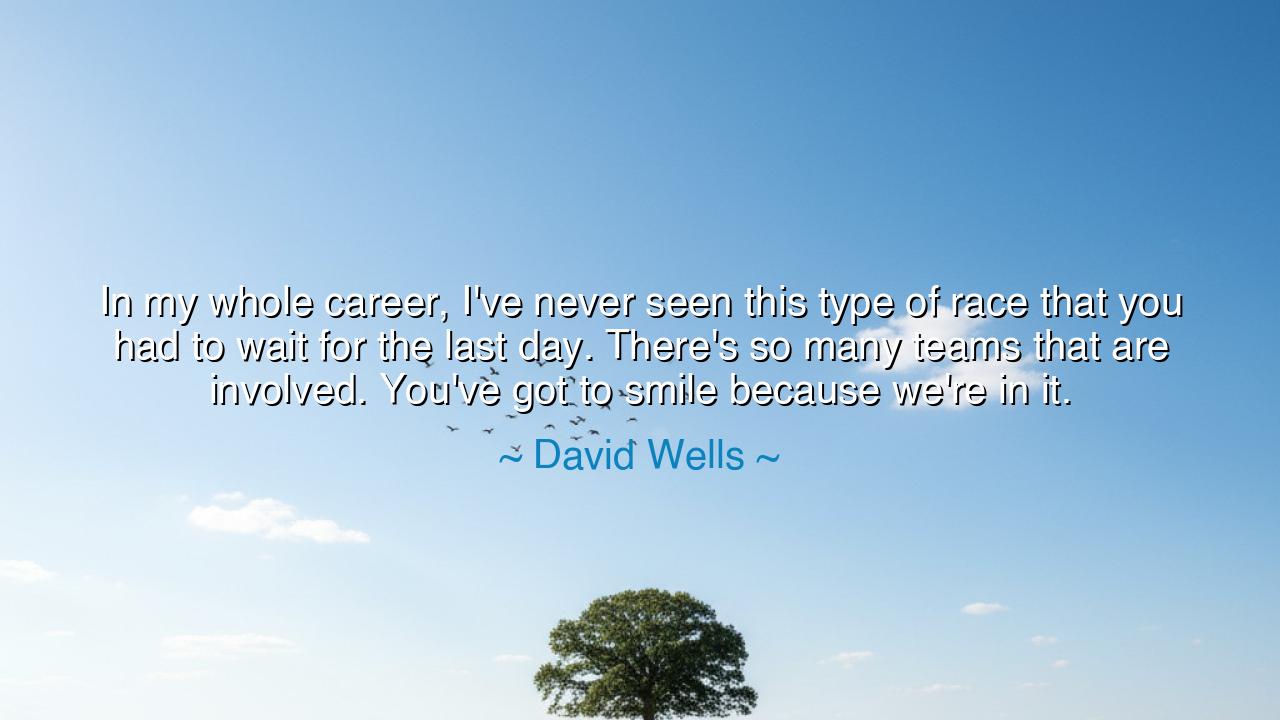
In my whole career, I've never seen this type of race that you
In my whole career, I've never seen this type of race that you had to wait for the last day. There's so many teams that are involved. You've got to smile because we're in it.






David Wells, a man forged on the pitcher’s mound and seasoned by the battles of many seasons, once declared: “In my whole career, I’ve never seen this type of race that you had to wait for the last day. There’s so many teams that are involved. You’ve got to smile because we’re in it.” His words, though born from the tension of sport, carry within them a truth that belongs to all who contend in the great arena of life. For he speaks of uncertainty, of struggle, of a contest so close that its outcome lies hidden until the very end—and of the courage to meet it not with despair, but with a smile.
The ancients themselves would have nodded at this wisdom. For the Greek tragedians and historians alike taught that the path of glory is rarely smooth, and the true measure of a man is not taken when victory is secure, but when the contest still hangs in balance. Wells’ words echo the philosophy of Herodotus, who wrote that no man may be called fortunate until his life is complete, for fate holds its surprises until the final day. So too in sport, so too in life—the race is never decided until the last inning, the last hour, the last breath.
Consider the great story of the 1980 “Miracle on Ice,” when the young American hockey team faced the seemingly invincible Soviets. The contest was uncertain, the odds steep, and the world watched with bated breath. Yet the Americans played with joy and fearless resolve, embracing the moment as Wells counsels us to smile. They understood that to even be “in it,” to stand toe-to-toe with giants, was itself an honor. And in that spirit of joy and defiance, they seized one of the most improbable victories in sporting history.
The deeper meaning of Wells’ words is this: participation in the struggle is itself a form of triumph. To stand among the teams competing for the crown, to endure to the very end, is to be alive in the fullest sense. Too often men and women despair when victory is uncertain, when the future is unclear. Yet Wells reminds us that the presence in the fight is itself cause for gratitude. To be tested to the limit is proof that one has reached the arena of the worthy.
Mark this well: a smile in the face of uncertainty is no small thing. It is the emblem of courage, the outward sign that one’s spirit has not been crushed by doubt. The soldier in the trench, the worker laboring for a dream, the student standing before a final exam—all face their own “last day.” And those who carry a smile into that hour of decision prove themselves stronger than fear. For joy, when chosen in the face of pressure, is the most heroic defiance.
Practical wisdom springs forth: when you find yourself in a contest that is close, when the outcome lies beyond your control until the end, do not waste your strength in dread. Instead, anchor yourself in the present moment, grateful that you are among the contenders. Strive with all your might, yet remember to smile. For the struggle itself is the proof of your place, and the tension of the race is the sign that you are alive, tested, and worthy.
Therefore, O seeker, let David Wells’ words be a guide: whether in the game of sport, the game of labor, or the game of life, do not fear the last day of decision. Welcome it with joy. To be “in it” is itself a gift. Let your smile shine even when the outcome is hidden, for that smile is the mark of the unbroken spirit—the spirit that knows true victory is not only in the prize, but in the courage to contend until the end.






AAdministratorAdministrator
Welcome, honored guests. Please leave a comment, we will respond soon